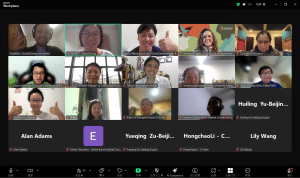When it comes to the environmental protection issues discussed during China’s “Two Sessions” this year, carbon neutrality and resource conservation received most attention from the public, with 55.2 percent and 54 percent of respondents to a questionnaire claiming to be concerned, respectively. The questionnaire was carried out by the Social Survey Center of China Youth Daily.
Plastic Free China, a Guangzhou-based NGO focused on eliminating plastic pollution, summarized the suggestions and proposals related to plastic reduction and emissions reduction during the Two Sessions.
Cai Weiping, a delegate to the National People’s Congress and chief expert at the Infectious Disease Center of the Eighth Hospital Affiliated to Guangzhou Medical University, suggested a complete ban on voluntary provision of single-use plastic utensils by restaurant delivery services.
The National Development and Reform Commission should take the lead in formulating a nationwide policy to prevent delivery platforms from voluntarily providing disposable plastic boxes or utensils and set up a reduction target by 2030 for each province and city, Cai suggested.
Tian Chunyan, a delegate to the National People’s Congress and vice president of Beijing Municipal Engineering Research Institute, proposed a reduction in unnecessary parcel packaging.
Her advice included reducing the production and use of solid waste such as plastic products from the source, strengthening legal supervision of the excessive packaging of products, establishing a functional recycling system — especially for express packaging boxes, and advocating greener living standards to the public.
Zhang Jindong, a delegate to the National People’s Congress and chairman of Suning Group, proposed establishing a carbon footprint certification for the logistics industry and the construction of more ecofriendly infrastructure. “In order to fully implement the decisions and deployments required to reach carbon neutrality, I propose incorporating green development into multiple areas of the entire chain of warehousing, transportation, packaging, and recycling in the logistics industry,” Zhang said.
He also suggested that logistics companies should promote packaging reduction, standardization and recycling, for example, through the application of big data, the amount of packaging required can be more efficiently calculated. Also, the product packaging design should be recycled as much as possible, and the material selection should be ecofriendly and recyclable.
Hong Mingji, a delegate to the National People’s Congress and executive director and CEO of Hop Hing Group, a Hong Kong food business, proposed speeding up the standardization of carbon emission reduction calculations in the catering industry. In key areas such as menu design, packaging, and advocacy of conservation in consumption, the underlying logic of carbon calculation should be clarified, and carbon emission reduction calculation standards should be formed, Hong suggested.
Zhao Jindong, a delegate to the National People’s Congress and academician at the Chinese Academy of Sciences, proposed drawing up a “banned burning list” for the waste incineration industry.
As the incineration plant lacks autonomy in the management of incoming waste, Zhao recommended that the Ministry of Housing and Urban-Rural Development draw up a list for the waste incineration industry in order to better carry out education and practice related to waste classification and further reduce related environmental risks. To begin with, categories of “recyclables” and “hazardous waste” can be clearly specified on the list, and the related departments can promote the implementation of the list in an orderly manner, especially for publicity and education work, Zhao suggested.
The Central Committee of the Jiusan Society, one of the legally recognized minor political parties in China, proposed establishing a modern observation and monitoring system as well as innovating the comprehensive supervision policy of the marine ecosystem, as China is currently facing problems such as prominent emerging pollutants (a large amount of land-based pollutants entering the sea, marine plastic waste, microplastics and emerging pollutants, etc.), degradation of marine ecosystems, and the growing vulnerability of coastal ecosystems.
The Central Committee of China Democratic League, another legally recognized minor political party in China, proposed improving mechanisms and standards in the monitoring and supervision of new pollutants, especially those lacking basic data, such as microplastics, PPCPs, typical EDCs, and perfluorinated compounds. For example, the committee suggested developing standardized testing methods, speeding up the standardization process of new technologies and methods, strengthening technical capacity building, and comprehensively carrying out investigative and special risk monitoring.



